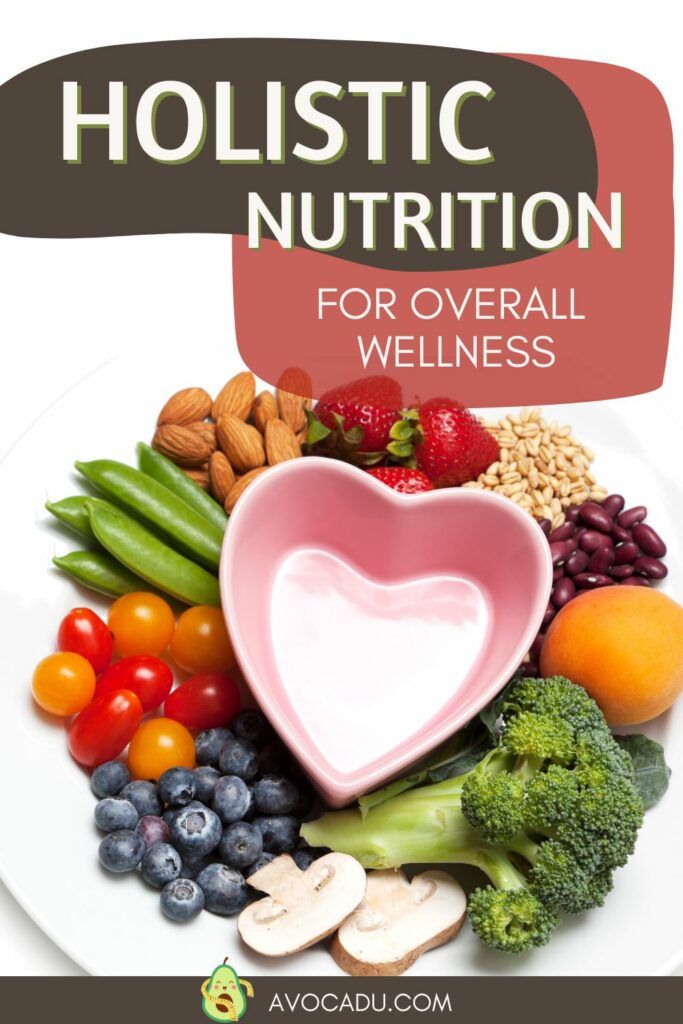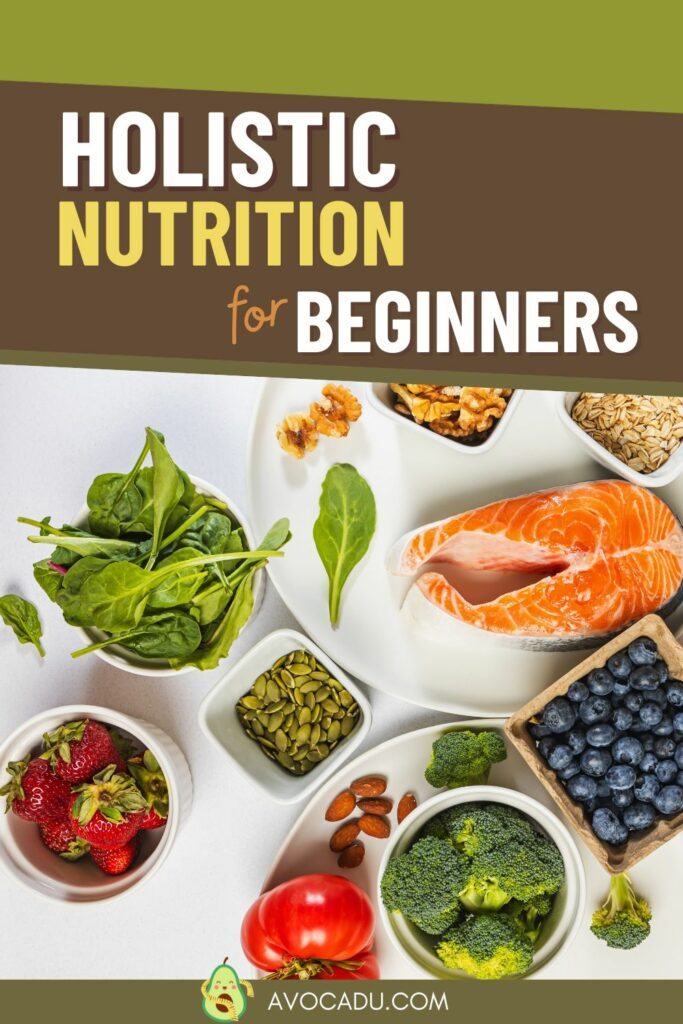Have you ever felt that there has to be more to eating well than just counting calories and tracking macros? If so, you’re not alone.
Many people are discovering that the traditional approach to nutrition doesn’t always address the bigger picture.
Holistic nutrition might be the answer you’ve been searching for. It’s an approach that goes beyond the numbers and looks at how what you eat impacts your entire being. Imagine a way of eating that not only fuels your body but also nurtures your mind and spirit.
Holistic nutrition is about treating your body as a whole and recognizing that every bite you take affects your physical health, mental clarity, and emotional balance. It’s a comprehensive way to achieve true wellness, making you feel better from the inside out.

This post may contain affiliate links, which helps keep this content free. Please read our disclosure for more info.
What is Holistic Nutrition?
Holistic nutrition takes a comprehensive approach to health, aiming to create harmony in your body and life.
It goes beyond focusing solely on individual symptoms or isolated dietary changes. Instead, it considers the person as a whole, acknowledging that physical health is intertwined with mental and emotional well-being.
This approach looks at how your diet interacts with various aspects of your life. It’s not just about what you eat, but how you live.
Your lifestyle, environment, and mental state all play significant roles in your overall health. For example, stress can impact digestion, and the quality of your sleep can affect your energy levels and food choices. Holistic nutrition looks to balance these factors, promoting overall wellness.
Unlike traditional nutrition approaches, which often zero in on specific nutrients or food groups, holistic nutrition emphasizes balance and variety.
It encourages eating a diverse range of whole, unprocessed foods that provide a broad spectrum of nutrients. This diversity ensures that you’re not just filling your stomach but truly nourishing your entire being.
Holistic nutrition also emphasizes mindful eating practices. This means paying attention to your body’s hunger and fullness cues, and being aware of how different foods make you feel.
It’s about listening to your body and understanding its unique needs, rather than following a one-size-fits-all diet plan.
By adopting a holistic approach to nutrition, you’re not only supporting your physical health but also enhancing your mental and emotional well-being, leading to a more balanced and fulfilling life.
Core Principles of Holistic Nutrition

Holistic nutrition focuses on a few key principles that support overall well-being. The first principle is to eat whole, unprocessed foods that are as close to their natural state as possible.
These foods are rich in essential nutrients and free from artificial additives and preservatives. By choosing these nutrient-dense options, you ensure your body gets a balanced array of vitamins, minerals, and other vital compounds.
Another important principle is variety. Including a wide range of foods in your diet helps you cover all your nutritional bases. Different foods provide different nutrients, and consuming a diverse diet helps ensure you’re getting a comprehensive mix of what your body needs.
Mindful eating is also central to holistic nutrition. This practice involves paying close attention to your body’s hunger and fullness cues, eating with intention, and savoring each bite.
It helps you become more attuned to your body’s needs and can prevent overeating or undereating. Mindful eating encourages you to appreciate the food you consume and to be more conscious of how it affects your body and mind.
Listening to your body’s signals and adjusting your diet accordingly is another crucial aspect. Your body is constantly communicating with you, whether it’s through energy levels, digestion, or mood changes.
By being attentive to these signals, you can make informed decisions about what to eat and when. This individualized approach helps you tailor your diet to support your unique needs and health goals.
Holistic nutrition also emphasizes the importance of food quality. Opting for organic, locally sourced, and seasonal foods can reduce your exposure to harmful chemicals and support more sustainable agricultural practices.
High-quality foods often have higher nutrient levels and better taste, enhancing both health and enjoyment.
Benefits of Holistic Nutrition

Embracing holistic nutrition can bring about a wide range of benefits that enhance both your physical and mental health.
Improved Digestion and Gut Health: One of the most immediate benefits is improved digestion. Whole, unprocessed foods are naturally easier for your body to break down and absorb.
They provide the necessary fiber to keep your digestive system running smoothly and maintain a healthy gut microbiome.
This can reduce issues like bloating, constipation, and indigestion, leading to a more comfortable and efficient digestive process.
Enhanced Energy Levels: When you fuel your body with a balanced diet rich in nutrients, you provide it with the essential building blocks it needs to function optimally.
This results in more consistent energy levels throughout the day, reducing the peaks and crashes often associated with processed foods and sugary snacks.
A steady supply of energy helps you stay active, focused, and productive, whether at work, home, or during physical activities.
Better Mental Clarity and Mood Stabilization: The food you eat has a significant impact on your brain function and emotional health.
Nutrients like omega-3 fatty acids, found in fish and flaxseeds, and antioxidants, present in fruits and vegetables, support brain health and cognitive function.
These nutrients can help stabilize your mood, reduce feelings of anxiety and depression, and improve overall mental clarity.
By nourishing your brain with the right foods, you can enhance your mental performance and emotional well-being.
Strengthened Immune System: A diet rich in vitamins, minerals, and antioxidants bolsters your immune system, helping your body fend off infections and illnesses.
Foods high in vitamin C, such as citrus fruits, and those rich in zinc, like nuts and seeds, play crucial roles in maintaining immune health.
A strong immune system not only helps you recover faster from illnesses but also reduces your risk of developing chronic conditions.
Long-term Health: Holistic nutrition is a powerful tool for preventing chronic diseases and promoting longevity.
By focusing on whole foods and balanced meals, you can manage and reduce risk factors for conditions such as heart disease, diabetes, and certain cancers.
The anti-inflammatory properties of many whole foods can also help manage existing health issues and prevent new ones from arising.
Over time, this approach supports sustainable, long-term health and well-being, allowing you to lead a vibrant, active life well into your later years.
Key Components of a Holistic Diet

A holistic diet is all about choosing foods that support your overall health and well-being. Here are the key components that make up a balanced and nourishing holistic diet:
Whole Grains, Fruits, and Vegetables: These foods form the cornerstone of a holistic diet. Whole grains like quinoa, brown rice, and oats are rich in essential nutrients and fiber, which support digestion and provide sustained energy.
Fruits and vegetables are packed with vitamins, minerals, and antioxidants that protect your body from free radicals and reduce inflammation. Including a variety of colorful fruits and vegetables ensures you get a wide range of nutrients to support overall health.
Healthy Fats and Proteins: Healthy fats and proteins are crucial for maintaining energy levels, building and repairing tissues, and supporting brain function.
Nuts, seeds, fish, avocados, and lean meats are excellent sources of these essential nutrients. Healthy fats, such as omega-3 fatty acids found in fish and flaxseeds, have anti-inflammatory properties and support heart health.
Proteins provide the amino acids necessary for muscle repair and immune function. Balancing these macronutrients helps keep you full and satisfied while providing the building blocks your body needs.
Natural and Organic Foods: Whenever possible, choose organic foods to avoid exposure to pesticides, hormones, and other chemicals.
Organic foods are often higher in certain nutrients and free from harmful additives. Eating natural and organic foods supports your body’s detoxification processes and reduces the risk of ingesting harmful substances.
This can lead to better overall health and a reduced burden on your body’s detoxification systems.
Herbs and Spices with Healing Properties: Herbs and spices are not only great for adding flavor to your meals but also offer numerous health benefits.
Turmeric, for example, contains curcumin, which has powerful anti-inflammatory and antioxidant properties. Ginger aids digestion and can help reduce nausea. Garlic is known for its immune-boosting properties and its ability to support heart health.
Incorporating these and other herbs and spices into your diet can enhance your meals’ nutritional value and provide additional health benefits.
Hydration: While not a food, proper hydration is a crucial component of a holistic diet. Drinking plenty of water supports digestion, nutrient absorption, and overall cellular function.
Herbal teas and water-rich fruits and vegetables can also contribute to your daily hydration needs.
Staying well-hydrated helps your body function optimally and can improve energy levels, skin health, and digestion.
Minimal Processed Foods: Reducing the intake of processed foods is key to a holistic diet. Processed foods often contain added sugars, unhealthy fats, and artificial ingredients that can harm your health.
By focusing on whole, unprocessed foods, you can avoid these harmful substances and provide your body with the nutrients it needs to thrive.
Holistic Nutrition and Mental Health

Your diet plays a significant role in your mental health. The foods you consume can directly impact your brain function, mood, and overall emotional well-being. Here’s how holistic nutrition supports mental health and why it’s essential to pay attention to what you eat:
Nutrients and Brain Function: Certain nutrients are critical for optimal brain function. Omega-3 fatty acids, for example, are found in fatty fish like salmon, walnuts, and flaxseeds.
These healthy fats are essential for maintaining the structure and function of brain cells. Studies have shown that omega-3s can reduce symptoms of depression and anxiety, improve mood, and enhance cognitive function.
They play a role in producing neurotransmitters like serotonin, which help regulate mood and emotion.
Antioxidants and Neuroprotection: Antioxidants, abundant in fruits and vegetables, protect the brain from oxidative stress.
This stress can damage brain cells and contribute to neurodegenerative diseases. Foods rich in antioxidants, such as berries, leafy greens, and nuts, can help protect brain cells and reduce inflammation.
Antioxidants like vitamin C, vitamin E, and flavonoids have been linked to better memory and cognitive function.
B Vitamins and Mood Regulation: B vitamins, including B6, B12, and folate, are vital for brain health. They help produce and regulate neurotransmitters that influence mood and mental clarity.
A deficiency in these vitamins can lead to mood disorders, including depression. Foods rich in B vitamins include whole grains, legumes, eggs, and leafy greens.
Gut-Brain Connection: The gut-brain axis is a fascinating aspect of holistic nutrition. Your gut health can significantly impact your mental health.
The gut microbiome, composed of trillions of bacteria, plays a role in producing neurotransmitters like serotonin, often referred to as the “happy hormone.”
A healthy gut can improve mood and reduce anxiety. Probiotic-rich foods such as yogurt, kefir, sauerkraut, and other fermented foods support a healthy gut microbiome and, in turn, promote better mental health.
Stable Blood Sugar Levels: Maintaining stable blood sugar levels is crucial for mental clarity and mood stability.
Foods that cause rapid spikes and drops in blood sugar, such as refined sugars and simple carbohydrates, can lead to irritability, anxiety, and poor concentration.
Hydration and Cognitive Function: Proper hydration is often overlooked but is essential for mental health. Dehydration can lead to cognitive impairments, mood swings, and increased feelings of stress.
Mindful Eating and Stress Reduction: Mindful eating practices can also contribute to mental well-being. Taking the time to eat slowly, savor each bite, and be present during meals can reduce stress and anxiety.
This practice encourages a more positive relationship with food and helps you tune into your body’s needs.
Avoiding Processed Foods and Additives: Processed foods and artificial additives can negatively impact mental health.
These foods often contain chemicals and preservatives that can disrupt brain function and mood. By focusing on whole, unprocessed foods, you can avoid these harmful substances and support better mental health.
Embrace Holistic Nutrition and Kickstart Your Transformation
Holistic nutrition is about more than just what you eat; it encompasses how your diet impacts every facet of your life.
By adopting a holistic approach, you can nourish both your body and soul, leading to improved health and overall well-being.
Ready to take the next step in your health journey? Consider joining the 21-Day Fat Loss Challenge.

This program is designed to help you integrate holistic nutrition principles into your daily routine, making it easier to achieve your health goals.
With structured guidance, support, and a focus on whole foods, this challenge can help you kickstart a healthier lifestyle.
Why not start today? Your body will thank you. Join the 21-Day Fat Loss Challenge and see the difference holistic nutrition can make.







